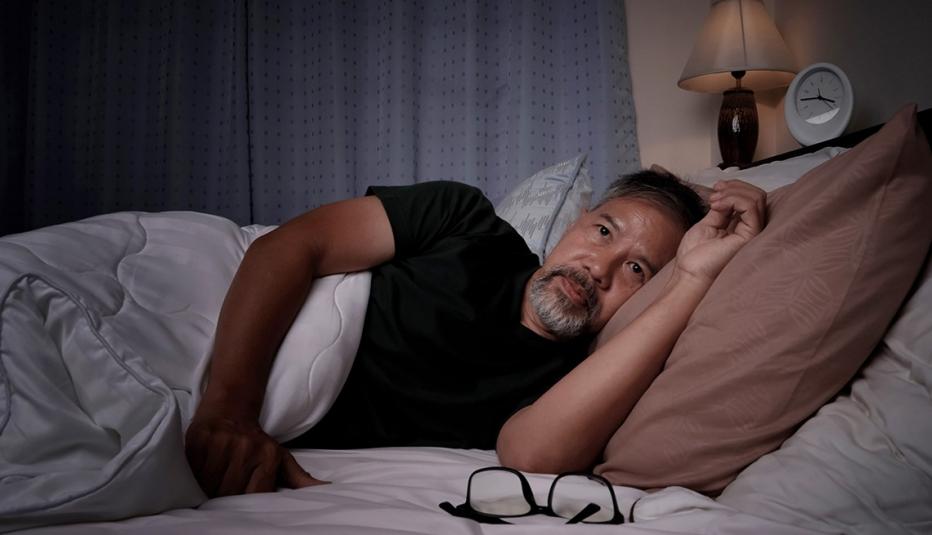AARP Hearing Center
Most older adults know they should get a good night’s sleep, but the reality is many don’t. A new AARP report shows that Americans often are needlessly suffering from poor sleep and dismiss the implications.


Seven in 10 (70%) adults 40 and older report having sleep difficulties, according to results of a national online and phone survey conducted in April. This group includes 52% who have trouble falling asleep, 59% who have problems staying asleep, 57% who wake up more than once per night, and 58% who wake up too early.
For 68% of respondents, sleep issues have been plaguing them for two years or more.
More than 90% of the older adults surveyed acknowledged poor sleep can hurt mental and physical health. Those who say they believe their health is fair or poor are more likely to sleep less or have worse sleep quality than those who get more rest. Three-quarters of older adults with poor quality sleep indicate it has negatively affected the quality of their life; 55% of those 50-plus say the same.
How consumers address the challenge — or don’t
Despite their struggles, 60% of respondents have never sought professional treatment such as getting medication or a machine to help with sleep.
The reason for the lack of action varies. Most commonly, respondents said they feel their problem is not that serious (38%). Others don’t believe in taking anything for sleep (27%), and another 27% think they get enough sleep.
To sleep more soundly, 60% of women use nonmedical interventions such as over-the-counter medicines, herbs and supplements, special bedding, sound machines, calming oils, or CBD products, compared to 47% of men who have tried those methods.
Women more than men also tend to follow doctor recommendations to have a medical sleep study (because of poor sleep, fatigue, snoring, or sleep apnea), according to the survey. Reasons for not completing a sleep study include cost and scheduling.
Adults in their 40s who report more trouble sleeping, higher stress, and poorer mental health, are more apt to reach out for professional help than those 50-plus. Older adults instead opt to focus on going to bed at the same time each night, avoiding caffeine later in the day, or keeping a cool bedroom — tips that are useful to adults of all ages.
Not getting enough rest can also take a financial toll. About four in 10 adults ages 40–49 report that sleep issues have had a negative monetary impact, as do 18% of those 50-plus.
Awareness and understanding
AARP discovered some misconceptions about sleep among older adults.
Among adults 40-plus with or without sleep problems, 36% mistakenly believe those over 65 need less sleep than younger adults. Poor sleep is not an inevitable part of aging, yet 41% of respondents think it is normal.
The survey also revealed some notable age-related findings concerning sleep. Older adults sleep more soundly and longer than those 40–49; unsurprisingly, therefore, adults 50-plus indicate they feel more rested and are more likely to be satisfied with the sleep they’re getting.
Without enough solid sleep, dozing off happens. When asked how often they fell asleep unintentionally before bedtime, about half (52%) of older adults admit they do several times a month or more. Men were more likely than women to say they nodded off before going to bed.
Implications
The findings demonstrate the need to better educate the public about ways to get more shut-eye and why it’s vital to well-being.
The report suggests physicians should discuss sleep difficulties with patients during their routine exams. To be sure, just half of adults surveyed say this was covered in their recent visit. There is consensus that sleep improves health, but the connection between chronic conditions and sleep quality is less proven.
Talking more openly about sleep and health could prompt more adults to seek help. The report highlights a variety of solutions and treatments (both professional and nonprofessional). Cost should also be part of the conversation.
Methodology
The report is based on a survey of 1,610 adults in the U.S. age 40 and over. The 15-minute poll was conducted online and by phone in April 2024 with an oversample of African American (n=428) and Hispanics (n=417) with NORC’s AmeriSpeak Panel.
For more information on the survey, contact Cheryl L. Lampkin at clampkin@aarp.org. For media inquiries, contact External Relations at media@aarp.org.






























































